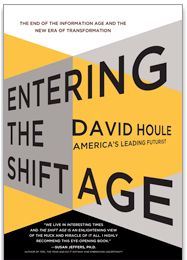

Is the Internet (and digital gadgetry) killing the novel, literary life and deep thinking? Do we live in an era of information abundance and opportunity—or an era of information overload and distraction? As another UVA publication, Hedgehog Review, so eloquently stated:
How do the technologies that humans form to engage the world come in turn to form us? What do these technologies that are of our own making and irreducible elements of our own being do to us? The analytical task lies in identifying and embracing forms of human agency particular to our digital age, without reducing technology to a mere mechanical extension of the human, to a mere tool.
I recently had an opportunity to discuss questions about creativity, publishing, and authorship—and how its future is being shaped by technology—with futurist David Houle, author of Entering the Shift Age, a book just out from Sourcebooks, their first release as part of a new agile publishing model. (More on that later.) Houle’s book discusses what’s coming in the next 10 years across all aspects of society, and he also has specific predictions for reading and publishing, including these:
The idea of “the book” will be widely broken down by the digital marketplace. There will be books published where certain chapters may sell in the tens of thousands at a low price while the “book” sells in the thousands.
E-books will continue to increase market share: in the U.S. trade press, 60% by end of 2014 and 75% by 2018.
Ownership of printed books will drop as a percentage of individual’s libraries or books read. People will own books largely because they either represent who they are (“I have all of John Updike’s work”), or because they have sentimental value (“This was given to me by Grandma”) or special provenance (“Marshall McLuhan once owned this volume.”)
In 2012, Houle was the keynote speaker at Digital Book World, a major publishing industry conference, and he’ll be speaking there again this month to talk about the agile publishing model with Sourcebooks. We touched on some of his new publishing predictions, plus big-picture issues of creativity, in a recent phone conversation.
———
The first thing I want to talk about is something I run into constantly when I’m speaking with creative people, what you call innovation fatigue, which is also combined with information fatigue. A lot of people ask me, from a practical standpoint, how to avoid that fatigue. I have a hard time answering that, because I feel like it’s a philosophical or existential problem. So how do you think a smart, progressive person approaches this issue? Do you think there are practical solutions?
That’s the most intelligent way I’ve heard this question phrased. It’s this question I can almost assure that if I have a Q&A, someone’s going to ask me how to deal with information overload.
One-hundred years ago when the landline was making its market penetration in the United States, the two most significant arguments against getting the landline were information overload and invasion of privacy. So the point is: Whenever we have any kind of new technology paradigm, we come from the present context of its newness and think that it’s overwhelming. When I keynoted at Digital Book World, the single-mosted tweeted comment from me was “We’re going to publish more books this week than were published in the year 1950.” There is this fascination with too-muchness.
On a more specific level—in 2010, humanity created a 1.8 zettabytes of data (one billion terabytes). A conservative projection is that it’s going to be 12,000 in the year 2040. We’re just beginning the information explosion. So, I say to people who ask me [about information overload], I think it’s just discipline, first of all. Just because it rings doesn’t mean you have to answer it. Just because you get an e-mail doesn’t mean you have to read it now. You always have to have a new discipline for something new. You learn to turn it off, and if you can’t, don’t complain. And [beyond discipline], I think the next wave on the Internet is trusted sources—curating the data.
One of the high-level analogies that William Gibson used was that the way the Internet is now is like test patterns on the black-and-white TV. It’s only going to get more intense. And I really think there’s an age template here relative to the angst of dealing with that.
One of the conflicts I often think about—and maybe it’s not a conflict, but it’s certainly framed that way often enough—we have this immersion in all sorts of media, combined with multitasking. I don’t place a value judgment on that, I don’t think it’s “bad,” but I also see that if I want to gather the energy to be creative, which you’ve called out as a top quality that’s going to be required by employers—and I would agree—we typically believe that requires large blocks of uninterrupted time and ability to remain in solitude. What’s interesting is that I see more people of all ages taking “digital sabbaticals” because they want to hear their own voice again. You predict in your book that in 10-20 years that we’ll have brainwave interface with computers, which will be the antidote to short attention spans. Can you speak to this conflict—having the focus and energy to be creative versus being immersed in media and multitasking?
I tend to think that either-or or ying-yang situations are contrived, to say that it’s either one or the other. That’s part of the limitation of what you just asked. But one answer is age related. For digital natives, there’s no such thing as information overload because they’ve been born into it, so that’s one thing. The older you are, the more you think you feel you need to take a digital vacation.
I read Walden when I was 18, and it changed my life. And Thoreau was one of my icons. And that was in the 1840s-50s, that he wanted to leave all the complexity of society behind. I think we’re looking at digital a bit too “this is the enemy.” But you’re right. When I write, I get up early, turn off the Internet, and write the book. So it might be a four-hour vacation. Thoreau went off for a year. There is validity to that.
On the other hand, if you take the long view, which is a new level of consciousness happening in 15 years, where we are now is an interim step in that trajectory. We’re getting all connected so it’s the collective creativity that’s occurring. I see that when I’m guest lecturing at the Ringling College of Art and Design. I see partial bits of creativity coming together collectively in the 18-23 year olds that then results in a faster creation of a project that was collaboratively done, than the older, more ego and identity-centered “I’ve got to go off by myself create my work of art.”
The younger you are, the more you want to influence the world. The older you are, the more you want to control the world. Control power has been around all of history. I want to control this country, I want to control this territory, I want to control this economy, I want to control this relationship. But influence power is going to be in ascendancy in a connected world. For example, Gangnam Style is a collective thing, is a meme, is very large, and will go away. It doesn’t have staying power. A 20-year-old doesn’t want to control something; they want to influence something for a week. So that relies on more of a sense of collaboration and sharing rather than ego-control.
Another thing is memes to movements. I think the future of marketing is about a meme, it’s not about taking decades to build a trusted brand. Gangnam Style is the most powerful brand in the world right now, just like Occupy was. How Occupy got defined was a shared definition, whether you liked it or not.
The other way to think about it is historically. Most people are digital immigrants. Digital immigrants are those who, as adults, learn how to use a cell phone or buy their first computer. Today’s kids have them from the time of awareness. For them, it’s much more seamless for them to share and to not have an ego separation for this activity. I think there’s going to be a fundamental shift in ego definition, generationally.
Your point about influence brings me to a question I have about your chapter on intellectual property (IP), where you say we’re about to enter the golden age of IP, where IP will equate to wealth. And while reading it, I couldn’t stop thinking about it in a pessimistic way, because in the news, I keep hearing about dismal patent wars. You write that the focus on IP is going to be about influence more than control, but right now, it seems the reverse. Will that change?
I think it is. When Microsoft went out and bought all those patents from AOL, what they were basically doing is creating a revenue stream for businesses they hadn’t been able to get into, so all of this stuff validates that IP is the wealth of the Shift Age, because that’s what people are fighting over. I think that IP is going to be shorter in length; if you talk about information overload and acceleration of change, then the cathode ray tube patent, which had a 50-year lifespan, that’s not going to happen any more. It’s going to be much faster. I think some of these patent wars are going to be more about influence for the next 3-5 years. They’re not trying to tie it up for 50 years. They’re just trying to win so they can get the iPhone 7 out. So I see it more as transitory engagements rather than long-term occupations.
There was recent talk by Bruce Sterling who said it doesn’t make sense to talk about the Internet any more—you can only really talk about Google, Amazon, Apple, Microsoft, and Facebook—meaning that they have this incredible power over media, delivery systems, distribution channels, pretty much everything. What’s your view?
I think they’re as powerful as we think. You can argue that these companies represent the dominant ecosystems right now. But, at any point in time, if you stand in the present context and project it forward, you have to somehow manage to project everything forward, not just one thing.
The interesting thing is, we’ve been starting to think in the last six months that maybe Apple doesn’t own it all. Maybe Samsung is really making a play here. And we forget the fact that Steve, may he rest in peace, on a larger scale is doing the same business model that almost annihilated Apple in the first place, which is everything is separate from Microsoft. Depending on the country you look at, it’s a 2.5 to 1 ratio of Android phones versus the iOS system. The big boys are slugging it out—that’s what we’re seeing. But there is always that independent person, someone like Ted Turner, saying I can beam my station over a satellite. I don’t see that kind of history changing. At any moment in time, there are going to be some dominant players. I can’t see it much beyond that framework.
So you don’t see anything “evil” about the machinations of these companies? Evil is an awfully weighted term to use here, but I know you’re aware of how often Amazon or Google is excoriated, especially in publishing circles.
This is where I look at my friend [publishing industry analyst] Mike Shatzkin, and I see his blind spot, because I’ve been in all these other media companies—TV, newspaper, magazines, Internet. Particularly with Mike, publishing’s in his DNA. He says, “Yeah, but publishing is different.” It’s like a newspaper editor in the 1980s. “Well, newspapers are different. We serve the public good.” Or radio. Nobody is immune. So people who are deep inside the DNA of their business have that as their inherent blind spot.
So let’s talk more specifically about book publishing. In your predictions, you mention that e-books will increase to 60% of market share by the end of 2014, and I would expect that, too. But lately, in industry circles, the common talking point is how much the growth has slowed down or leveled off. What do you think?
The first obvious answer is that when something goes from a half percent to 10 percent in three years, it’s almost impossible to replicate that rate of growth. So anyone who says, “The rate of growth is slowing,” well, yeah, obviously. It’s also a pattern with something new: E-books are cheaper, I probably have 30 books on my iPhone, and I’ve read 10, because they’re so easy to buy. Now I think that we’re in that phase of “I bought too much and I have to consume it.” And then I think it’s going to launch off again.
Your book was published as part of Sourcebooks’ new agile publishing model. Describe what that entailed.
There were three parts to the process.
1. Put up the content and let people give me input, like choreographed crowdsourcing.
2. Publish the book before it’s finished. So, in other words, I was writing on Part 4 of that book while Parts 1 & 2 were sold as e-books. Tied to that is the publishing of 12 mini-ebooks before the book is published.
3. An enhanced e-book with video.
To me, the most profound thing of the future is the slicing and dicing of the content. So, for example, a nonfiction book might sell 10,000 copies, but there might be a chapter in it that will sell 100,000 copies at 99 cents. All anecdotal research that I’ve done shows that most people don’t completely read nonfiction books. So now we’re giving you the chance to buy the part you want. And I’m living that space right now, where educators are buying the future of education slice. So it might become viral in that vertical of education, whereas it’s a general futurist book. So I find that a much more fascinating topic for thinking about the future of publishing than crowdsourcing and sharing.
I also think that the enhanced e-book with video—now that tablets are becoming a larger percentage of devices used for reading—will be a part of it. Coming from a TV background, I’ve always said as a futurist that Internet 2.0 equals video. It’s not social, it’s video. Ninety percent of all the data coursing through the Internet backbone in 2015 is going to be video. And if you think about it, what is the one thing from old media of the 20th century that seems to be migrating OK to the Internet? Video. Television. Not books, not newspapers.
———
To find out more about David Houle and his book, visit Sourcebooks’ page for the project.







